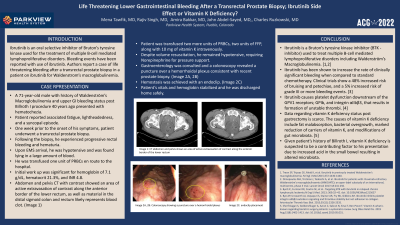Back


Poster Session B - Monday Morning
Category: GI Bleeding
B0341 - Life Threatening Lower Gastrointestinal Bleeding After a Transrectal Prostate Biopsy; Ibrutinib Side Effect or Vitamin K Deficiency?
Monday, October 24, 2022
10:00 AM – 12:00 PM ET
Location: Crown Ballroom

Has Audio

Mena Tawfik, MD
Parkview Medical Center, CO
Presenting Author(s)
Mena Tawfik, MD, Rajiv Singh, MD, Amira Bakkar, MD, John Abdel Sayed, MD, Charles Ruzkowski, MD
Parkview Medical Center, Pueblo, CO
Introduction: Ibrutinib is an oral selective inhibitor of Bruton’s tyrosine kinase used for the treatment of multiple B-cell mediated lymphoproliferative disorders. Bleeding events have been reported with use of ibrutinib. Authors report a case of life threatening bleeding after a transrectal prostate biopsy in a patient on ibrutinib for Waldenstrom’s macroglobulinemia.
Case Description/Methods: A 71-year-old male with history of Waldenström’s Macroglobulinemia and upper GI bleeding status post Billroth I procedure 40 years ago presents with hematochezia. He had associated fatigue, lightheadedness, and a syncopal episode. A transrectal prostate biopsy took place one week prior to the onset of his symptoms. Following the biopsy, he experienced progressive rectal bleeding and hematuria prompting him to contact EMS. Upon EMS arrival, he was found lying in a large amount of blood and hypotensive. He was transfused one unit of PRBCs en route to the hospital. Initial work up was significant for hemoglobin of 7.1 g/dL, hematocrit 21.3%, and INR 4.8. He was transfused two more units of PRBCs, two units of FFP, along with 10 mg of vitamin K intravenously. Despite volume resuscitation, he remained hypotensive, requiring Norepinephrine for pressure support. Gastroenterology was consulted and a colonoscopy revealed a puncture over a hemorrhoidal plexus consistent with recent prostate biopsy, where hemostasis was achieved with an endoclip. Patient’s vitals and hemoglobin stabilized and he was discharged home safely.
Discussion: Ibrutinib is a Bruton’s tyrosine kinase inhibitor (BTK -inhibitor) used to treat multiple B-cell mediated lymphoproliferative disorders including Waldenström’s Macroglobulinemia. Ibrutinib has been shown to increase the rate of clinically significant bleeding when compared to standard chemotherapy. Clinical trials show a 48% increased risk of bruising and petechiae, and a 5% increased risk of grade III or more bleeding events. Ibrutinib causes platelet dysfunction downstream of the GPV1 receptors; GPIb, and integrin αIIbβ3, that results in formation of unstable thrombi. Data regarding vitamin K deficiency status post gastrectomy is scarce. The causes of vitamin K deficiency include fat malabsorption, bacterial overgrowth, marked reduction of carriers of vitamin K, and modifications of gut microbiota. Given patient’s history of Billroth I, vitamin K deficiency is suspected to be a contributing factor to his presentation due to increased acid in the small bowel resulting in altered microbiota.

Disclosures:
Mena Tawfik, MD, Rajiv Singh, MD, Amira Bakkar, MD, John Abdel Sayed, MD, Charles Ruzkowski, MD. B0341 - Life Threatening Lower Gastrointestinal Bleeding After a Transrectal Prostate Biopsy; Ibrutinib Side Effect or Vitamin K Deficiency?, ACG 2022 Annual Scientific Meeting Abstracts. Charlotte, NC: American College of Gastroenterology.
Parkview Medical Center, Pueblo, CO
Introduction: Ibrutinib is an oral selective inhibitor of Bruton’s tyrosine kinase used for the treatment of multiple B-cell mediated lymphoproliferative disorders. Bleeding events have been reported with use of ibrutinib. Authors report a case of life threatening bleeding after a transrectal prostate biopsy in a patient on ibrutinib for Waldenstrom’s macroglobulinemia.
Case Description/Methods: A 71-year-old male with history of Waldenström’s Macroglobulinemia and upper GI bleeding status post Billroth I procedure 40 years ago presents with hematochezia. He had associated fatigue, lightheadedness, and a syncopal episode. A transrectal prostate biopsy took place one week prior to the onset of his symptoms. Following the biopsy, he experienced progressive rectal bleeding and hematuria prompting him to contact EMS. Upon EMS arrival, he was found lying in a large amount of blood and hypotensive. He was transfused one unit of PRBCs en route to the hospital. Initial work up was significant for hemoglobin of 7.1 g/dL, hematocrit 21.3%, and INR 4.8. He was transfused two more units of PRBCs, two units of FFP, along with 10 mg of vitamin K intravenously. Despite volume resuscitation, he remained hypotensive, requiring Norepinephrine for pressure support. Gastroenterology was consulted and a colonoscopy revealed a puncture over a hemorrhoidal plexus consistent with recent prostate biopsy, where hemostasis was achieved with an endoclip. Patient’s vitals and hemoglobin stabilized and he was discharged home safely.
Discussion: Ibrutinib is a Bruton’s tyrosine kinase inhibitor (BTK -inhibitor) used to treat multiple B-cell mediated lymphoproliferative disorders including Waldenström’s Macroglobulinemia. Ibrutinib has been shown to increase the rate of clinically significant bleeding when compared to standard chemotherapy. Clinical trials show a 48% increased risk of bruising and petechiae, and a 5% increased risk of grade III or more bleeding events. Ibrutinib causes platelet dysfunction downstream of the GPV1 receptors; GPIb, and integrin αIIbβ3, that results in formation of unstable thrombi. Data regarding vitamin K deficiency status post gastrectomy is scarce. The causes of vitamin K deficiency include fat malabsorption, bacterial overgrowth, marked reduction of carriers of vitamin K, and modifications of gut microbiota. Given patient’s history of Billroth I, vitamin K deficiency is suspected to be a contributing factor to his presentation due to increased acid in the small bowel resulting in altered microbiota.

Figure: Colonoscopy Findings
Disclosures:
Mena Tawfik indicated no relevant financial relationships.
Rajiv Singh indicated no relevant financial relationships.
Amira Bakkar indicated no relevant financial relationships.
John Abdel Sayed indicated no relevant financial relationships.
Charles Ruzkowski indicated no relevant financial relationships.
Mena Tawfik, MD, Rajiv Singh, MD, Amira Bakkar, MD, John Abdel Sayed, MD, Charles Ruzkowski, MD. B0341 - Life Threatening Lower Gastrointestinal Bleeding After a Transrectal Prostate Biopsy; Ibrutinib Side Effect or Vitamin K Deficiency?, ACG 2022 Annual Scientific Meeting Abstracts. Charlotte, NC: American College of Gastroenterology.
